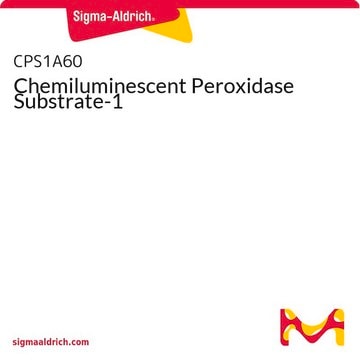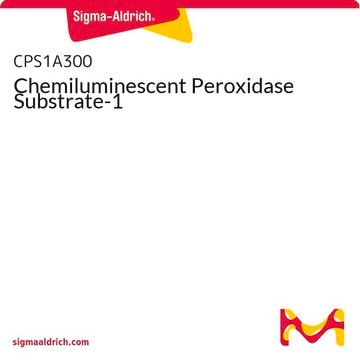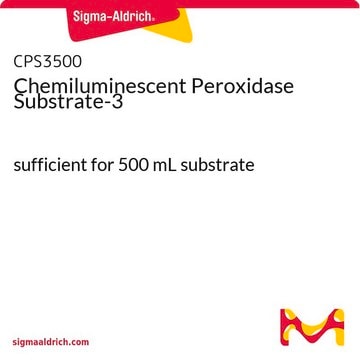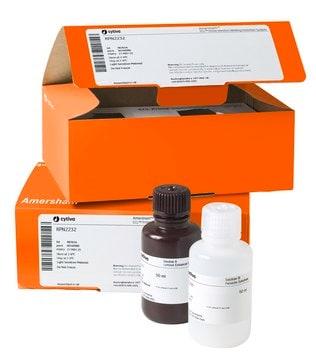CPS350
Chemiluminescent Peroxidase Substrate-3
sufficient for 50 mL substrate
Synonym(s):
CPS3
Sign Into View Organizational & Contract Pricing
All Photos(1)
About This Item
Recommended Products
Looking for similar products? Visit Product Comparison Guide
Application
Chemiluminescent Peroxidase Substrate-3 has been used for the quantification of aptamer binding. It has also been used in endopeptidase assay to determine the enzymatic activity of botulinum neurotoxins (BoNTs).
CPS3 formulations are economically priced and outperform the most commonly used competitors′ products. This two component system provides low nanogram detection with superior signal-to-noise ratio. In addition, the components are stable after mixing, adding to the flexibility of usage.
Storage Class Code
10 - Combustible liquids
Flash Point(F)
Not applicable
Flash Point(C)
Not applicable
Certificates of Analysis (COA)
Search for Certificates of Analysis (COA) by entering the products Lot/Batch Number. Lot and Batch Numbers can be found on a product’s label following the words ‘Lot’ or ‘Batch’.
Already Own This Product?
Find documentation for the products that you have recently purchased in the Document Library.
High level expression and immunochemical characterization of botulinum neurotoxin type F light chain
Chauhan R, et al.
Protein Expression and Purification, 146, 51-60 (2018)
Selection of DNA aptamers for extra cellular domain of human epidermal growth factor receptor 2 to detect HER2 positive carcinomas
Sett A, et al.
Clinical And Translational Oncology, 19(8), 976-988 (2017)
Arghya Sett et al.
Translational research : the journal of laboratory and clinical medicine, 183, 104-120 (2017-01-15)
Estrogen receptor alpha (ERα) also known as NR3A1 (nuclear receptor subfamily 3, group A, member 1) is a ligand-activated transcription factor. It is an important biomarker for breast cancer metastasis. In the present study, we report a novel DNA aptamer
Yanpei Liu et al.
Plant physiology, 183(1), 194-205 (2020-03-12)
Photorespiration is an essential process in oxygenic photosynthetic organisms triggered by the oxygenase activity of Rubisco. In peroxisomes, photorespiratory HYDROXYPYRUVATE REDUCTASE1 (HPR1) catalyzes the conversion of hydroxypyruvate to glycerate together with the oxidation of a pyridine nucleotide cofactor. HPR1 regulation
Our team of scientists has experience in all areas of research including Life Science, Material Science, Chemical Synthesis, Chromatography, Analytical and many others.
Contact Technical Service








